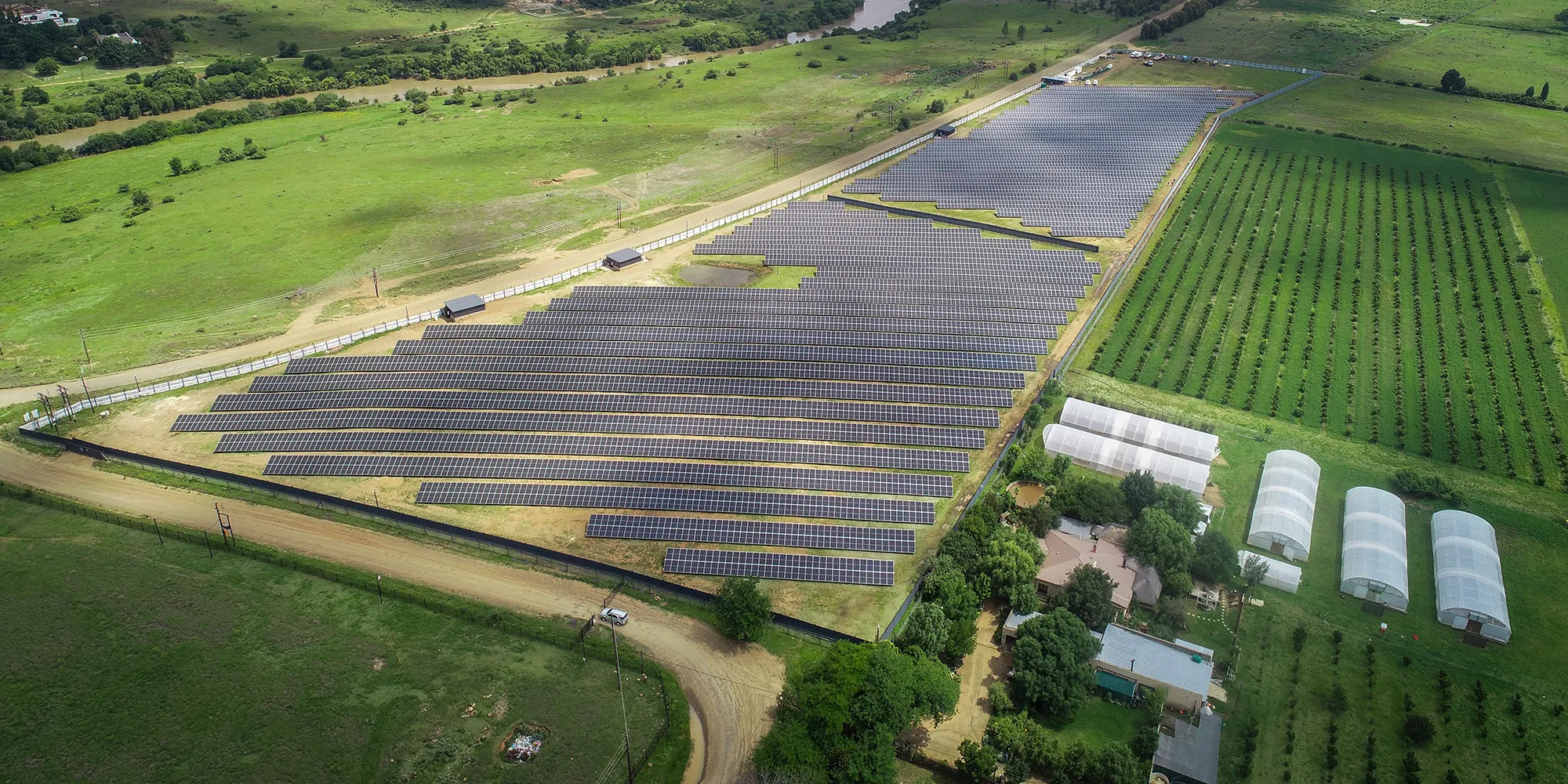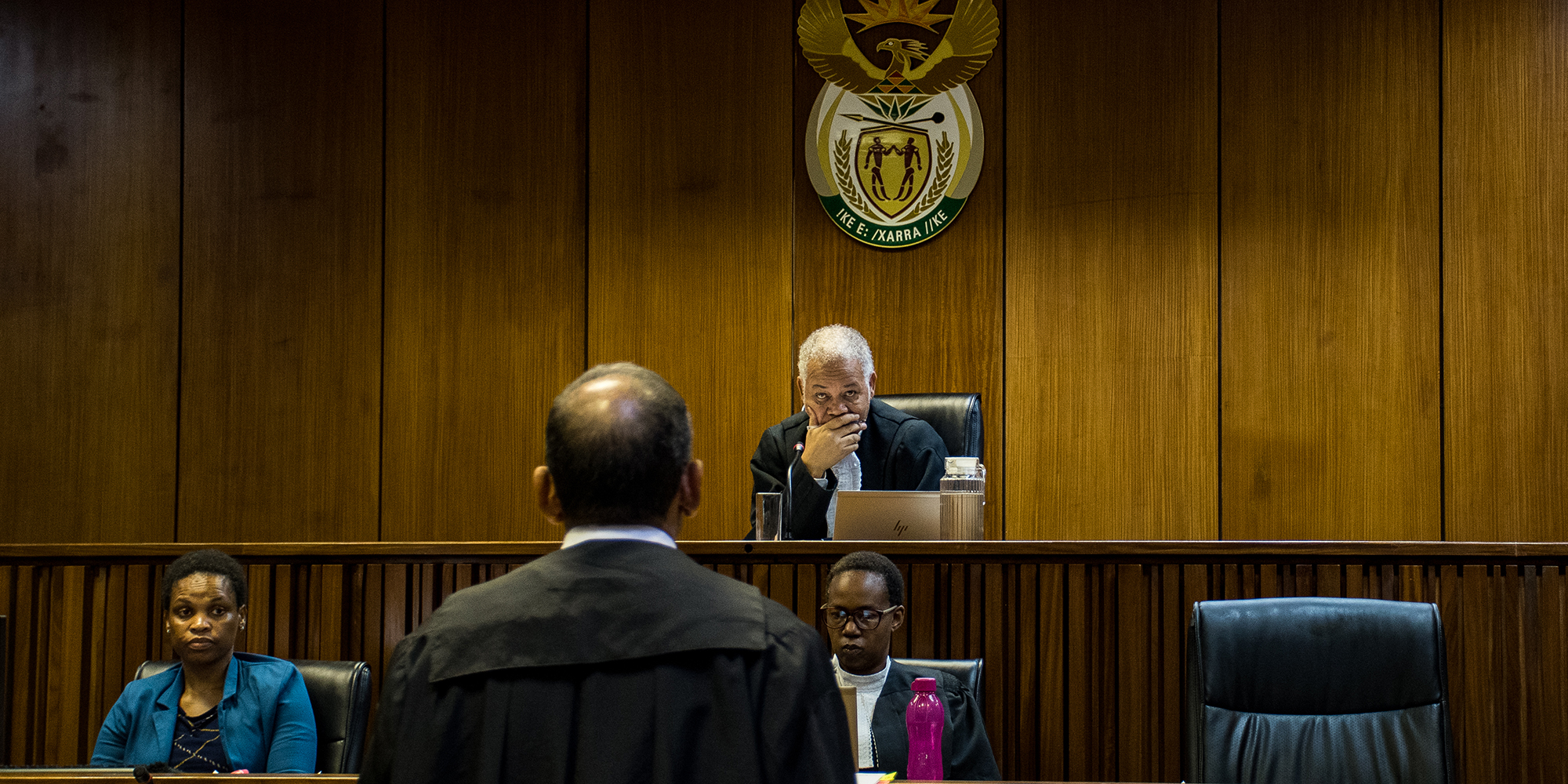On Thursday, 20 April, Judge Edwin Molahlehi handed down his judgment electronically, dismissing private electricity distributor Rural Maintenance’s urgent application to preserve the status quo filed against Eskom – meaning it is no longer allowed to alleviate rolling blackouts in Frankfort with alternative power from a nearby private solar farm.
Read more in Daily Maverick: Small Free State town in high court battle with Eskom over use of solar energy to reduce load shedding
From February this year Rural Maintenance’s subsidiary, Rural Free State (RFS), entered a three-month trial with Eskom where it was allowed to “self-load shed” on behalf of the Mafube Local Municipality.
RFS implemented “voiding” – reducing the amount of load shedding Mafube had as a result of the electricity they could provide from a newly commissioned private solar farm in Frankfort, which currently has a generation capacity of 4.26 megawatts.
For example, in one week in February, RFS was able to reduce load shedding by 18%, due to the additional power from the sun farm, which it said had “resulted in less diesel being used and/or less inconvenience suffered”.
But on 16 March, the applicants said they had received correspondence from Eskom saying that if it didn’t stop “voiding”, the utility would not allow RFS to control load shedding anymore. That’s when Rural took Eskom to court, applying to preserve the status quo until the National Energy Regulator of South Africa (Nersa) finds a resolution or investigates its complaint.
Because Mafube Municipality never provided its signed affidavit there was no legal confirmation that the first and second applicants had received authorisation to file the case against Eskom.
Then on 5 April, Eskom appeared at the Johannesburg High Court and brought up that one of the applicants in the case – Mafube Local Municipality – had not provided an affidavit showing their support of the application.
Advocate Etienne Lasuschagne, who is representing the applicants in the case (Rural Maintenance and co) told Judge Molahlehi that the affidavit was coming, and the hearings went ahead.
 FFS Renewable Pty Ltd, a solar farm in Frankfort, Free State, owned by 21 private individuals, farmers and businesses (active in the Mafube community. The first part of its now 4.2MW of generation capacity was commissioned at the end of 2021. (Credit: SNW consulting)
FFS Renewable Pty Ltd, a solar farm in Frankfort, Free State, owned by 21 private individuals, farmers and businesses (active in the Mafube community. The first part of its now 4.2MW of generation capacity was commissioned at the end of 2021. (Credit: SNW consulting)
Daily Maverick approached Mafube municipal manager Mothusi Lepheane at the time, asking whether the municipality supported this application with Rural Maintenance, seeing as the Mafube Local Municipality is named as an applicant in the case.
Lepheane responded: “No comment.”
Lack of support from municipality lost the case
Judge Molahlehi released his judgment on Thursday afternoon, dismissing Rural Maintenance’s application to preserve the status quo due to Eskom’s challenge of authority (the missing affidavit from Mafube Local Municipality).
The missing affidavit proved pivotal to the outcome of the case. Eskom pointed to rule 7 of the Uniform Rules of Court, which “provides a safeguard to prevent a cited person from repudiating the process and denying his or her authority for issuing the process”, according to North Global Properties (Pty) Ltd v Body Corporate of Sunrise Beach Scheme.
Because Mafube Municipality never provided its signed affidavit there was no legal confirmation that the first and second applicants had received authorisation to file the case against Eskom.
Since the municipality did not sign on, the trial came down to Rural Maintenance, a private company, and its subsidiary taking Eskom to court. For this reason, the case was considered “not properly before the Court” and therefore it failed. Rural Maintenance, Rural Maintenance Free State and the Mafube Business Forum are expected to pay all costs of the trial.
Political meddling?
CEO of Rural Maintenance Chris Bosch said in a statement to Frankfort residents on Thursday: “The sole reason provided by the Honourable Judge in his judgment, relates to the fact that the Municipality decided not to get involved in the legal matter.
“We have no doubt that should the Municipality have placed the needs of its community at the forefront, a different result may have been forthcoming. We can only hope there was no political meddling from outside of Mafube.”
Rural Maintenance has managed the network distribution for Mafube for the past 11 years, after taking it over from a struggling Mafube Local Municipality, which was losing money.
Rural Maintenance reported that the municipality has received R22-million up until September 2022 from royalties that RFS pays to it for running the distribution.
 Azhar Bham, senior counsel representing the respondents, and Advocate Catherine Kruyer during the case between Rural Maintenance and Eskom at the Gauteng Local Division of the High Court in Johannesburg on 5 April 2023. (Photo: Julia Evans)
Azhar Bham, senior counsel representing the respondents, and Advocate Catherine Kruyer during the case between Rural Maintenance and Eskom at the Gauteng Local Division of the High Court in Johannesburg on 5 April 2023. (Photo: Julia Evans)
At the time of the court case, Bosch told Daily Maverick that Mafube Local Municipality was originally on board with Rural Maintenance’s plan, with Lepheane saying: “Eskom cannot do this to the people in Mafube” and that the affidavit would come.
But then the treasury official for the municipality told them, “this has got nothing to do with Mafube, this has got to do with people outside trying to make sure that this project doesn’t happen”, and when they asked for the affidavit again, it never arrived.
Rural Development speculated that the reasons for the missing affidavit could be political interference.
“We are obviously very disappointed with the outcome of the court case – especially in light of the fact that there is no negative impact for the Eskom national grid,” said Bosch. “What is especially hard to swallow is the reluctance of the Mafube Local Municipality to support Rural’s effort to lessen load shedding, while constant load shedding seems to be our future.
“Small businesses and citizens from all walks of life in Frankfort have come to rely on the reduction of load shedding when the sun was shining.”
Dumping solar power
On the same day (21 April) Eskom is forced to implement Stage 6 rolling blackouts due to the failure of generating units at the Tutika, Kriel, Duvha and Kendal power stations, RFS now has had to switch off portions of the sun farm after losing the case.
21 April 2023: Stage 6 loadshedding will be implemented at 05:00 until further notice. This is due to failures of generating units at Tutuka, Kriel, Duvha and Kendal power stations since yesterday. Eskom will publish a further update as soon as there are any significant changes.
— Eskom Hld SOC Ltd (@Eskom_SA) April 21, 2023
“This means Rural Free State will no longer be allowed to lessen the negative effects of load shedding when the sun is shining and, in turn, will have to dump unused solar energy while parts of Frankfort experience load shedding,” said Bosch.
Eskom responds
Eskom said on Friday afternoon that the statements by Rural Maintenance are “misleading as Eskom does not place any restrictions on their use of self-generated electricity”.
“Eskom welcomes the use of electricity from independent power producers that can assist in alleviating load shedding,” it continued. “What Eskom requires from RFS as a responsible participant in the national grid is to comply with the requirements of the Code of Practice in order to protect the national electricity network in the interest of the country as a whole.”
The utility emphasised that Nersa requires all licensees to implement the National Code of Practice for Emergency Demand Reduction and System Restoration Practices to ensure the fair implementation of load shedding and to protect the integrity of the national electricity grid.
Regarding the court outcome, Eskom said that as a public entity it “remains committed to implement all required measures to protect the national electricity grid”, and is relieved by the dismissal of Rural Maintenance’s application.
But as the dismissal of the case was on the grounds of Mafube Municipality’s missing affidavit, not Rural Maintenance’s failure to comply with the load shedding code of practice, Eskom said it wished to address a “misconception” – that, while it did approve RFS’ trial to self-load shed starting in February, “self-load shedding allows a qualifying municipality to protect its critical loads such as sewerage systems and water pumps from interruptions”.
“Problems between the two parties emerged when RFS introduced ‘voiding’, a term created by them to describe a situation where they do not implement load shedding as per the approved schedules during daytime hours when their solar PV plant is in optimal operation.
“Eskom repeatedly rejected this proposal and attempted to help RFS understand why this is unacceptable and in violation of NRS048-09. It is at this stage that Rural Maintenance opted to institute legal processes against Eskom.”
Bosch added: “Rural will make a concerted effort to continue to engage both Eskom and Nersa in an attempt to try and understand Eskom’s reluctance to support Rural’s initiative.” DM/OBP
For tickets to Daily Maverick’s The Gathering Earth Edition, click here.
https://www.youtube.com/watch?v=REeWvTRUpMk




 Azhar Bham, senior counsel representing the respondents and Advocate Catherine Kruyer, during the case between Rural Maintenance and co versus Eskom, heard at the Gauteng Local Division of the High Court of South Africa, in Johannesburg on 5 April 2023. (Photo: Julia Evans)
Azhar Bham, senior counsel representing the respondents and Advocate Catherine Kruyer, during the case between Rural Maintenance and co versus Eskom, heard at the Gauteng Local Division of the High Court of South Africa, in Johannesburg on 5 April 2023. (Photo: Julia Evans)